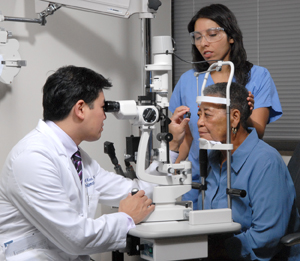After Cataract Surgery: Long-Term Eye Care
After cataract surgery, it's important to have regular dilated eye exams. This is the best way to check the health of your eyes. It will help you keep good vision. Schedule an eye exam at least once a year or as directed by your eye care professional.
Wear sunglasses and a hat with a brim when you are outdoors. Stop smoking if you smoke. Stay away from secondhand smoke. Follow a healthy diet. Eat leafy green vegetables and foods such as salmon that are high in antioxidants.

New eyeglasses
Your vision will be better after surgery. But you may need new eyeglasses to fine-tune your vision. Your eye healthcare provider will test your vision while you’re healing. You will get a new eyeglass prescription if needed when you are fully healed. A lot of people may only need simple drugstore reading glasses after surgery.
Treating a secondary cataract
Months or years after surgery, a secondary cataract may form. It's caused by cells that grow between your new lens and the capsule that holds it. It's not painful. But it may cause vision problems similar to the first cataract. Examples are blurry vision or increased glare off of lights. In most cases, a secondary cataract can be treated in your eye healthcare provider's office or at an outpatient surgical center.
Laser treatment (YAG capsulotomy) can be used for this. It's a painless procedure. It takes only a few minutes. Your pupil is dilated, and a laser beam is used to make an opening in the capsule that holds the new lens. This allows more light to enter. It will improve your vision right away.
Online Medical Reviewer:
Chris Haupert MD
Online Medical Reviewer:
Tara Novick BSN MSN
Online Medical Reviewer:
Whitney Seltman MD
Date Last Reviewed:
8/1/2022
© 2000-2024 The StayWell Company, LLC. All rights reserved. This information is not intended as a substitute for professional medical care. Always follow your healthcare professional's instructions.